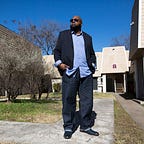Incarcerated Voter Rights
Voting is one of the most basic of human rights that all people should have.
I would like to set the stage, if you will, with a quote from Fannie Lou Hamer, the somewhat unsung heroine of the voting rights movement in America. After she attended a civil rights meeting, Fannie said, “They talked about how it was our rights as human beings to register and vote. I never knew we could vote before. Nobody ever told us.”
Firstly, I’m from Texas and in Texas, you are allowed to vote once you have completed your sentence. But few people with my background know this. Oh someone will tell you when you are leaving prison, that you are allowed to vote once you’re off parole. However, facing 10 or 12 years on parole, voting isn’t the first thing that comes to mind. This is why it’s imperative to allow folks to vote while they are incarcerated. Especially people in city and county jails, who haven’t been convicted of felony. Regardless of a person’s conviction, that person doesn’t deserve to be treated less than human. Even if that person has committed a harmful act, should we the public behave towards him or her in the same fashion. What does that make us? Should we the public behave in the same manner as the individual we are punishing? For us, this seems to be irrational and illogical.
Secondly, Just as one should have access to the freedom of speech, freedom of religion — regardless of their criminal justice involvement, so should they have access to deciding who their elected officials are. It is democratically unfair to pick and choose which of the bill of rights is applicable to Americans. Nothing about a conviction makes an individual any less of an American. To that point, a person can still be elected to Congress or the Presidency with a conviction. So the voting rights of folks incarcerated or formerly incarcerated shouldn’t be impinged upon in the same fashion. Do we stop someone from going to church, the mosque or the temple, because of their criminal background? Even in prison people have access to religious choice. In Texas, after a person has been off parole for five years, they are allowed to own a gun, which is inline with the 2nd Amendment. As absurd as that sounds, it’s no more absurd than the notion that these same people shouldn’t be allowed to vote.
Finally, it’s the obvious racial implications of denying people incarcerated the right to vote that make up the onus of this point. Black people have been denied the vote for longer, than they have had access to the vote. Black people and people of color have always been first in line when the denial of rights were being handed out. Overwhelmingly our criminal justice system impacts people of color more than any other group. If only by default of impact, we are aware of the severe limitations imposed on people of color in regards to socioeconomic status, access to healthy foods and living conditions. We continue this systemic oppression through gerrymandering and denying certain groups to participate in a participatory democracy. Giving incarcerated people political power through voting strengthens our democracy — not weakens it.
With that, we would like to end the same as we began with a quote Malcolm X said, “1964 will be the year of the ballot or the bullet.” In 2020 we see this quote is more applicable now, than it was then.
